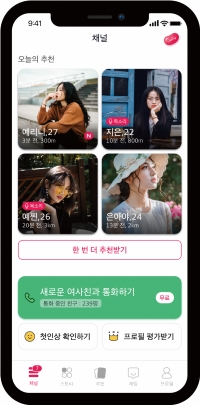Comfortably socialize and fight through COVID-19 - WIPPY

Can we still meet people with similar interests and get through COVID-19 together? Wippy is a social networking application for those in their 20s and 30s, created by Kim Bong-gi from NRISE. Inc, a start-up company.
In 2014, NRISE. Inc started with an application called MOCI. It was an anonymous communication channel where users could freely talk without having to expose their personal information. Kim believed true happiness can be found through interactions, which was why he created a space that brought people together.
“We faced many drawbacks with MOCI,” Kim said. “It was run in a way that people could write stories on cards and post them. However, this anonymous system was misused as people made ridiculous fake stories to gain attention. This messed up the system completely.”
Building on feedback gathered from MOCI’s, Wippy was born. It was not anonymous and had a strict registration process. It was launched in 2017 as a social networking service inspired by dating applications. However, its purpose was different.
“In order for the system to suggest friends, we consider the user’s interests and match accordingly,” Kim explained. “It is inevitable that people want to meet the opposite sex, but since our goal is to make friends, the system suggests at least one friend of the same sex weekly.”
Wippy focuses on personalized matches where users can browse through different hobbies and find those similar to them. Wippy’s data showed that people tend to prefer those that are nearby, which was one key factor for finding friends. Users are given the opportunity to select who they would like to talk to, given the provided description without the system interfering.
“Many people misunderstand that developers of Wippy are manipulating the system,” Kim said. “But all we do is work on reports of suspicious people or inappropriate behavior.”
Following the social distancing protocols during COVID-19, the monthly active users began showing patterns. In the early stages of the pandemic, between March and May, users decreased. Wippy started the year with 305,863 monthly active users then, in March it decreased to 259,299. According to Kim, this was because people were limited to meeting offline. Many people using Wippy simply met online first and then eventually met inperson.
Despite the decrease, monthly users increased by 20 percent and it reached their most active period in August with 401,398 users. Currently, the trend is still at its highest with monthly active users in September calculating up to 392,511.
“With the pandemic lasting longer than anyone expected, I think people realized that it is going to be hard to meet new people offline,” Kim commented. “Admitting that, it was normal for them to rely on online platforms.”
Kim believes this is the chance for society to change its perspective on socializing with people online. It is still evident in Korea that society has negative views on meeting people through social networking services. He explained that because of this preconception, it is hard to advertise and promote Wippy. For example, advertisements emphasizing ‘meeting people’ were banned in Korea even if it did not have any inappropriate intentions.
“Now is the perfect time for people to get comfortable with socializing online, and even reach out to people from other countries,” Kim said.
Tinder bringing together - Gen Z, socializing in the pandemic

Tinder has become the foremost online dating app and now has an established reputation worldwide with more than 340 million downloads in over 40 languages. The famous swipe right or swipe left has become synonymous with finding people you want to interact with based on their photo. Two people match when they have both swiped right and they can begin talking. With enhanced social distancing measures, Ewha Voice investigated how Tinder has facilitated remote dating.
First introduced on university campuses in 2012, more than 50 percent of Tinder users are between 18 and 25 years of age, otherwise known as Gen Z. They are, according to Seo Ga-yeun, the General Manager of Tinder and Match Group Korea, “the most openminded generation in history,” who are “inspiring us to leave the world of dating better than we found it.”
Tinder’s Seoul office opened in 2017, and the group is passionate about bringing the application to its Korean users, with college students actively engaging in company marketing through social media management.
With the onset of the COVID-19 pandemic, the application has seen an increase in activity. According to Tinder, this is due to a combination of increased time at home and living the shared experience of the global pandemic. In Korea, conversations peaked on April 19, which followed the lifting of strict social distancing rules. This period also correlated to a 55 percent increase in swipes, implying a heightened interest in connecting with others online.
Interestingly, Tinder’s Common Interest feature also saw Nintendo’s popular game ‘Animal Crossing’ surge with a fivefold increase in mentions during lockdown.
“We used to say that our goal was to get people to meet in real life, but we learned many people cannot distinguish between URL and IRL [in real life]. So, we stopped asking how a relationship should look like and started to embrace how it actually looks,” Seo said.
So far, this approach from Tinder has created a somewhat open space for people to keep interacting. Never in history have people had such a wide-ranging access to a diverse set of people.
But, with enhanced connectivity, discovery also brings the risks of unwanted aggravation. Seo is very aware of potential safety concerns. In efforts to combat harassment, Seo said that users are encouraged to only interact with people who have verified profiles.
“On Tinder, we have introduced photo verification which allows members to verify their identity through a series of real-time posed selfies. Verified profiles will display a blue checkmark so members can trust their authenticity,” Seo explained.
As the pandemic is still sweeping across the world, masks and social distancing in public have become integral parts of life. Whether apps like Tinder substitute for real-life interactions and normalize dating in the time of COVID-19 is an open question. While there may be a soaring number of users on Tinder, it remains to be seen whether this will truly give people the tools to satisfy their real desires for actual in-person interaction.
Discussing the importance of socialization with sociology experts
In order to delve into the phenomenon of socializing during COVID-19, Ewha Voice interviewed two professors from the Department of Sociology, Professor Trent M. Bax and Professor Kim Hyun-soo.
Q: Due to the social distancing measures, many people gave up on interacting in person. What type of physical and psychological changes have we seen as a result?

Professor Bax: COVID-19 has not only been an assault on the biology and physiology of those it has infected, but it has also been an assault on one of our most important human needs. In order to obtain mental health and thus avoid mental illness, humans must meet the need of ‘relatedness’ (to be in social relations with other humans). Since COVID-19 has made it more difficult to satisfy this deep human need, it is not surprising that in Vol. 8 of Ewha Voice it was stated there has been a ‘surge’ in online counseling requests from students suffering from the ‘corona blues’ (depression, anxiety, irritation, etc.).

Professor Kim: Social interaction is a fundaental aspect of what it means to be human. We internalize our values, for example, through meeting people and learning from social experiences. Without social interaction it would be difficult for us to have a strong sense of who we are, what we believe in, and what we consider to be important. Also, the loneliness we feel from the lack of socializing is a significant stressor that can result in poor mental and physical health.
Q: In order to socialize during the pandemic, more people are using applications to meet people online. What are your opinions on such applications? Do you think they promote meaningful relationships and effective communication?
Professor Bax: The manager of Ewha Student Counseling Center, Oh Hye-young, effectively said onlinebased counseling is a very poor substitute for face-to-face counseling because “Nonverbal cues such as eye contact, tone, and sitting posture are what form a rapport.” This principle can also be applied to ‘connections’ made online through platforms such as Tinder and Wippy. Online ‘connections’ are very poor substitutes for ‘the real thing.’
Unlike real-world face-to-face relationships, we must be aware that social media and app companies are monetizing our relationships as they conduct ‘surveillance capitalism.’ Social media companies use ‘behavioral tracking’ and ‘psychographic profiling’ to better understand its ‘users’ in order to more effectively target advertising at them. In essence, users are being manipulated because social media companies seek to understand, exploit and modify peoples’ innermost emotions, fears, needs and vulnerabilities. When profit and exploitation force themselves between human relationships, then that makes it more difficult to satisfy our need for relatedness and thus obtain or maintain our mental health.
Q: In this current state of social, economic, and political difficulties due to the coronavirus crisis, how should people cope?
Professor Kim: I think we need to prioritize social responsibility over individual rights. Of course, no one wants to be quarantined. However, if everyone rejects it and exercises “too much freedom,” the end result can be disastrous. We do not know how long the current situation will continue. Nonetheless, the key to overcoming the coronavirus and returning to the state of “new normal” is to be collectively responsible. I would like to encourage everyone to set aside their personal desires and wishes and consider collective wellbeing at the top of their priority.

